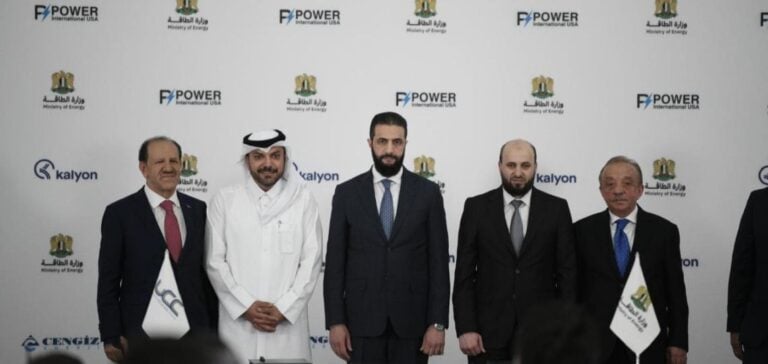The Syrian Arab Republic has signed a $7bn energy agreement with an international consortium to restore its electricity generation capacity, which has been severely affected by fourteen years of conflict. The agreement was concluded at the presidential palace in Damascus in the presence of Acting President Ahmad al-Chareh and the United States Special Envoy for Syria, Thomas Barrack, Connaissance des Énergies reported on May 29.
The project includes the construction of four gas-fired power plants in the central and eastern regions of the country, as well as a 1,000-megawatt solar farm in the south. According to Syrian authorities, the new infrastructure will deliver a total capacity of 5,000 megawatts, covering nearly 50% of the country’s current electricity demand.
A multinational consortium at the forefront
The consortium is led by Qatar-based UCC Concession Investments and also includes Turkish firms Kalyon GES Enerji Yatirimlari and Cengiz Enerji, along with Power International USA. This initiative represents a coordinated deployment of foreign capital and technology in a context where local infrastructure has deteriorated significantly, with power outages lasting up to 20 hours a day.
Syrian Minister of Energy Mohammad al-Bashir stated that the power plants would be equipped with technologies sourced from the United States and European countries. The equipment is intended to improve grid reliability and reduce service interruptions.
Expected employment and diplomatic impact
UCC Chief Executive Officer Ramez al-Khayyat said the programme is expected to generate over 50,000 direct jobs and 250,000 indirect jobs. No detailed implementation timeline has been provided, but work is expected to begin once regulatory approvals are secured.
This cooperation takes place amid a gradual normalisation of diplomatic relations between Damascus and several foreign capitals. Since the fall of President Bashar al-Assad in December, ties have strengthened between Syria and the governments of the United States, Qatar and Turkey. The energy project marks one of the first tangible outcomes of this renewed diplomatic momentum.
Energy recovery outlook
Until now, Syria’s power grid has relied on outdated facilities, vulnerable to attacks and lacking in maintenance. The combined use of gas-fired plants and solar capacity signals an attempt to diversify supply sources and stabilise service. The consortium has not disclosed details regarding financing or the investment return timeline.






















